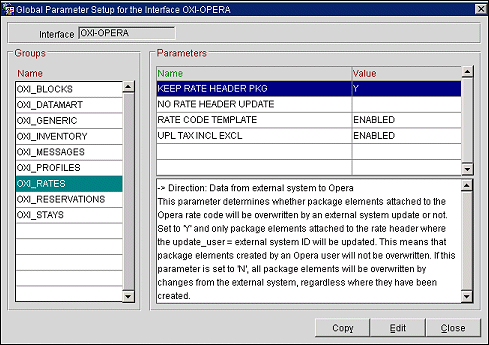
OXI_RATES Parameters for OXI_HUB
Example: Screen OXI_RATES group parameters.

Note: All parameters are set at the global level.
Copy. This feature is only available when a user is assigned the OXI_PARAMETERS permission for the affected property. This function allows you to copy parameters and settings to other properties in a Centrally Hosted environment.
Edit. Use this button to change a parameter's setting.
Close. Use this button to exit from the parameter's screen.
Rate parameters apply if your interface transmits rates.
Parameter Name |
Parameter Value |
Direction of transmission where parameter applies. Parameter Description |
Recommended Setting |
|---|---|---|---|
HANDLE RATES POSTING RHYTHM |
FULL OVERLAY IGNORE KEEP UPDATE |
-> Direction: Data from external system to Opera This parameter determines how to handle the incoming Rate Posting Rhythm (applies to non-V3 interfaces only). When set to FULLOVERLAY, existing Rate Posting Rhythm will get overwritten with the incoming value. When set to UPDATE, update Rate Posting Rhythm only if existing value is null. When set to KEEP, keep existing Rate Posting Rhythm if the received value is null. When set to IGNORE, incoming Rate Posting Rhythm will be ignored. |
Set Accordingly. |
KEEP RATE DETAILS |
M S P Y |
-> Direction: Data from external system to Opera This parameter determines whether the Market code, Source Code, Package Elements and Yield Adjustment information of rate code details will be overwritten by an external system update or not. This parameter can be set to a single value or a comma separated combination of following : M: Market Code S: Source Code P: Package Elements Y: Yield Adjustments For example if we don't want any modifications to any of these we will set this parameter as 'M,S,P,Y'. To allow updating of this column information just don't set any value in the parameter list. |
Set Accordingly. |
KEEP RATE HEADER PKG |
Y/N |
-> Direction: Data from external system to Opera. This parameter determines whether package elements attached to the Opera rate code will be overwritten by an external system update or not. Set to Y and only package elements attached to the rate header where the update_user = external system ID will be updated. This means that package elements created by an Opera user will not be overwritten. If this parameter is set to N, all package elements will be overwritten by changes from the external system, regardless where they have been created. |
Set to Y if ORS package elements should be kept. The default setting is Y for OXI-V6, OXI-V7, OXI-Opera |
NO RATE HEADER UPDATE |
|
-> Direction: Data from external system to Opera. Select the letters for the rate header columns that shall not be updated by rate change messages from external systems. Values: A - Rate Description B - Rate Category C - Folio Text D - Market Code E - Source Code F - Commission G - Minimum Stay Through H - Maximum Stay Through I - Advance Booking J - Suppress Rate K - Print Rate L - Long Info M - Short Info N - Transaction Code |
Select all letters that apply. This highly depends whether a GDS interface is installed at the ORS level, in which case the update of most rate header columns sent by external system should be prevented. |
RATE CODE TEMPLATE |
ENABLED/DISABLED/ MANDATORY |
-> Direction: Data from external system to Opera Valid values are Enabled, Disabled and Mandatory. When Enabled the Interface will check if the rate code being sent from External System exists in the rate code Template. If the rate code is not part of the Template, Interface will add the rate code to the Template. When Mandatory The Interface will check if the rate code being sent from External System exists in the rate code Template and if the rate code does not exist, message will be rejected and an error message generated informing the user to add the rate code to the Template. When Disabled the rate code being sent from External System will not be subject to the rate code template check and the message will be processed. |
Set to the setting that reflects the needs of the customer and region where the hotels are located. Default is DISABLED, as not all incoming rates may be wanted in the ORS Template for use in multiple properties. |
RATE DETAIL MESSAGE HANDLING |
(see description) |
-> Direction: Data from external system to Opera This parameter applies only when receiving rate messages of type DETAIL, whereby OXI will not receive all rate details belonging to that rate, but is requested to update individual rate details as present in the message. This parameter determines processing principles when receiving details that offend existing rate details (i.e. existing rate DETAIL for one of the room types with dates overlapping). FAIL: When receiving an offending rate detail, OXI will FAIL the message and report RESULT FAIL in the result message returned to the sender. REMOVE: When receiving an offending rate detail, OXI will remove all existing offending rate details and rely on the external system to provide all other replacing details in subsequent messages. REQUEST: When receiving an offending rate detail, OXI will FAIL the message and request the FULL RATE from the sending system. For this setting, the external system must support MESSAGEREQUEST V3 or higher. MAKE ROOM: Make room for the incoming rate details, during this process conflicting rate details will be appropriately adjusted to make room for incoming rate detail using split/insert/update and delete operations. |
Set Accordingly. |
UPL TAX INCL EXCL |
ENABLED/DISABLED |
-> Direction: Data Opera to external system. Disabled means that taxes on rate codes will not be considered. Enabled means OXI will include or exclude tax depending on Opera tax include flag on property configuration screen. |
Set to the setting that reflects the needs of the customer and region where the hotels are located. |
See Also